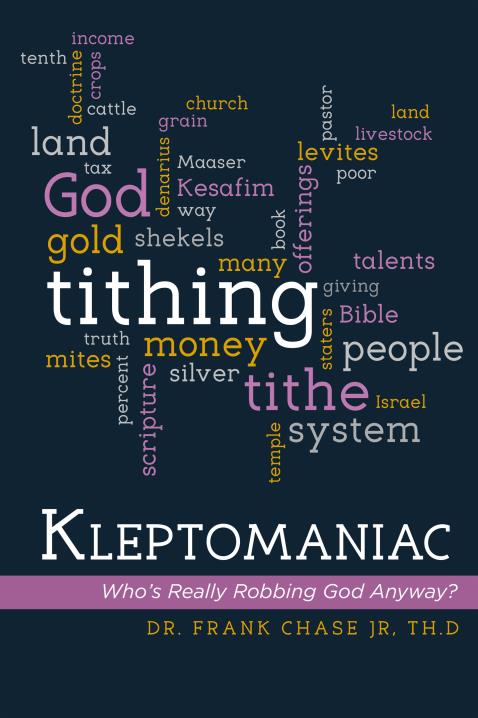Author and former military man Frank Chase Jr. grew in Baltimore, MD. He got interested in writing from watching movies and listening to a radio show called mystery theatre, but it was only in his thirties after a divorce that his desire to write escalated. His debut book “False Roads to Manhood: What Women Need to Know: What Men Need to Understand” took him seven years of research and writing. If he weren’t a writer, Frank would be a stage actor as it has been his passion since high school.Being a writer has taught him that everyone will not agree with you or what you may write, but it leaves a record and a legacy that can help future generations long after you have passed on. He is currently writing a scripture-centered book and also plans on writing a fiction novel soon. Read full interview…
Take Kleptomaniac: Who’s Really Robbing God Anyway on a email book blog tour. Get a copy of the Blog Tour below and help me celebrate the one year anniversary of Kleptomaniac: Who’s Really Robbing God Anyway by sending my book on an email Book Blog Tour with your email network of friends or however your choose. Go to the link below and get the book blog document and share with your email network of friends.
Frank Chase–Kleptomananiac Book Blog Tour Small pdf
Source: Kleptomaniac: Who’s Really Robbing God A | Frank Chase Jr

One of the quintessential arguments pro-tithers make in defense of collecting a tenth of income from believers is that since Abram paid a tithe to Melchizekek before the law, somehow that onetime, single act makes every Christian obligated to pay Yahweh a tithe of their income for life. Most people sitting pews don’t think to ask what did Abram really give to Melchizedek. Well, let me tell you, it is a question everyone should ask before writing that check to the church for ten percent. No, I’m not saying you should not give to your church, but I am saying, scritpture interprets scripture and we get that from term line upon line and precept upon precept. In the book of Hebrews, Chapter 7, the writer explains what items were given to Melchizedek as tithes (verse 4), and who is authorized to collect and receive tithes from the congregation of Israel (verse 5 ) . In Hebrews, Chapter 7, the Bible is clear when it says:
4 Now consider how great this man was, unto whom even the patriarch Abraham gave the tenth of the spoils. 5 And verily they that are of the sons of Levi, who receive the office of the priesthood, have a commandment to take tithes of the people according to the law, that is, of their brethren, though they come out of the loins of Abraham: (KJV)
As you can see in the above verses, the key words is the tenth of the spoils. What Abram gave to Melchizedek come from the spoils of wars. In other transliterations the word plunder is used. And let me say this, if anyone looks at the customs of the time dealing with battles and wars. It was alway cutsom to give a tithe to the priest king of the winning side. Now let’s look at how the contemporary English Bible renders the text to see if we can get a little closer to what the tithe content was that Abram paid to Melchizedek. Now Genesis 14:20 does not identify what the items were that Abram took back from the losing Kings. So the question becomes what would waring soldiers and their leaders bring to the battle field and encampment? When you start putting on your thinking caps, it really gets hard to see how Abram paid a money tithe to Melchezedek. And it really gets insane, when you hear that since Abram tithed before the law, we tithe under grace. First of all, the tithe Abram paid was not the same tithe instituted under the law in Leviticus. Now look at the words, a commandment to take tithes the levitical priesthood. Is your pastor a part of the Levitical priesthood? Is he a decendant of sons of Levi by direct bloodline? If not, I hate to bring you good news, but you are not required to tithe. In the verse, when it tithes were taken from the people, what people is the verse speaking about? Well, the people in verse 5 are the 11 tribes of Israel that farmed, herded cattle and raieded flocks who paid the tithes to Levites. The light should be shinning now and a question mark should appear over your head as to what a tenth of the spoils mean in reference what Abram gave. The greek word for “spoils” Strong’s Akrothininion (#205), It primarily means the top of the heap: hence the firstfruits offerings, and in war the choicest spoils. Since Abram captured all the other King’ss stuff, let’s examine what would be in the heap. If one does a theological search for spoils throughout the Bible, here is what you will find in a pile or heap on the battle field after a war. Their could be skin stripped off a pelt, weapons and vaulubles stripped off of enemy soldiers, the first fruits (crops), so that would be the food the soldiers brought, and because the Kings requested Abram to give back the captured people, the people were also a part of the spoils of war tithe that Abram would have given. However, he gave the people back. So since the the Hebrew people were trying to understand Christ, the Hebrew writer wanted them to understand that the perfect priesthood of the Messiah notwithstanding his decent from Judah, replaces the imperfect and transitory priesthood of Levi, therefore no tithe command is passed on to believers in the Yeshua (Jesus) who are in the Priesthood of Christ and that’s because we are all kings and priests according to Revelation 10:5 And hast made us unto our God kings and priests: and we shall reign on the earth. The tithe law was disestablished under the Priesthood of Christ and we know this becuase Hebrews says this:
12 For the priesthood being changed, of necessity there is also a change of the law. 14 For it is evident that our Lord arose from Judah, of which tribe Moses spoke nothing concerning priesthood. 15 And it is yet far more evident if, in the likeness of Melchizedek, there arises another priest 16 who has come, not according to the law of a fleshly commandment, but according to the power of an endless life. 18 For on the one hand there is an annulling of the former commandment because of its weakness and unprofitableness, …
It was the Levites and priest who received tithes in the Old Testament. It is important to understand who the book of Hebrews addresses. It was talking to the Hebrew isrealite believers who accepted the messiah. He told them the priesthood changed so a change in the law would happen as well. What law was changed? In this context, it is clear the tithing law changed becuase verse 18 says there was a annuling of the former commandment. Well, the former commandment in verse 18 aludes to was the tithing commandment mentioned in verse 4 of Hebrews, Chapter 7. This totally debunks a so-called grace tithe or any other tithe of money in the New Testament. Don’t be fooled by slick scriptural hermanutics that redefines biblical food tithing into monetary tithing. You can get signed paperbacks, just order Kleptomaniac: Who’s Really Robbing God Anyway? from Paypalme for $23.87
So, when I did my intial tithing slides on Abram and the tithe before the law, I discovered some characteristics about Abram tithe. So check the slides below. Get informed on tithing by reading the ebook for Kleptomaniac: Who’s Really Robbing God Anyway?
Check out new video book trailer for Kleptomaniac Who Really Robbing God Anyway?
Back in July I did a tithing interview with the Larry Love show on my new book, Kleptomaniac: Who’s Really Robbing God Anyway? http://www.blogtalkradio.com/thelarryloveshow/2016/07/26/author-of-kleptomaniac-who-is-really-robbing-god-dr-frank-chase-jr
Check out these places for my book and the full book review for Kleptomaniac: Who’s Really Robbing God Anyway on Midwest Book Review at: Midwest Book Review Another book excerpt in my book deals with New Testament giving and you read the excerpt titled, The Church and Its Money Grab
Here an excerpt from the reivew by Diane C. Donavan, Senior Reveiwer MBR,
Dr. Chase’s attention to detail in covering the history of tithing and his analysis of what constitutes an authentic tithe in keeping with God’ Biblical directives includes a great deal of research into early Greek and Hebrew writings, creating a weighty yet authoritative, accessible piece filled with empirical evidence and discussions central to the tithe’s place in Christian theology. Although its research-backed history is not light reading, its attention to well-researched detail is impeccably presented, and represents a breath of fresh air to a topic typically laden with more emotion than reasoned inspection. Kleptomaniac: Who’s Really Robbing God Anyway is an ebook from Amazon and in PDF, iPad and Kindle from Book Baby.
The result is a thought-provoking read which is very highly recommended for any Church member interested in the history and ongoing debate over tithes, their mandate, and where and how they are spent.
1. https://store.bookbaby.com/book/kleptomaniac
2. Quotesrain: http://www.quotesrain.com/book/4754/
3. Twitter: @drfrankchasejr
4. facebook: https://www.facebook.com/kleptomaniac10percent/
5. Goodreads: https://www.goodreads.com/book/show/30238254-kleptomaniac?ac=1&from_search=true
6. Readers’ Favorite: https://readersfavorite.com/book-review/kleptomaniac
7. Self Publishing Review: http://www.selfpublishingreview.com/2016/08/an-interview-with-frank-chase-jr-author-of-kleptomaniac-whos-really-robbing-god-anyway/
8. AskDavid: http://askdavid.com/item/0975521772
9. Book Daily: http://www.bookdaily.com/book/5481447/kleptomaniac-who-s-really-robbing-god-anyway
10. Overdrive Library: https://www.overdrive.com/media/2964829/kleptomaniac-who’s-really-robbing-god-anyway
11. Booklife: http://booklife.com/project/kleptomaniac-who-s-really-robbing-god-anyway-19097
12. Open Library: https://openlibrary.org/works/OL17589475W/Kleptomaniac
13. Book of the Day: http://bookoftheday.org/kleptomaniac-whos-really-robbing-god-anyway-dr-frank-chase-jr-th-d/
14. Bublish: https://www.bublish.com/bubble/stream/10673
15. LibraryThing: https://www.librarything.com/work/18338845
 Kleptomaniac: Who’s Really Robbing God Anyway? by Frank Chase Jr
Kleptomaniac: Who’s Really Robbing God Anyway? by Frank Chase Jr
My rating: 5 of 5 stars
The book is very insightful and informative about the history of tithing and giving in the Church. The book is a fascinating journey into the land, language and literature of the Israelite people and their tithing practices. The author meticulously examines tithe verses and brings to light their meaning using the Hebrew and Greek language. Even if one does not agree with his analysis, it would be difficult to dismiss what the author’s findings reveal. If a person seeks to gain a real understanding and education about tithing and its original meaning, this book is a good place to begin your theological research journey. They say knowledge is power and this book certainly contains a lot of knowledge. Get a copy at https://www.fcpublishing.com/about_kle….


















Recent Comments